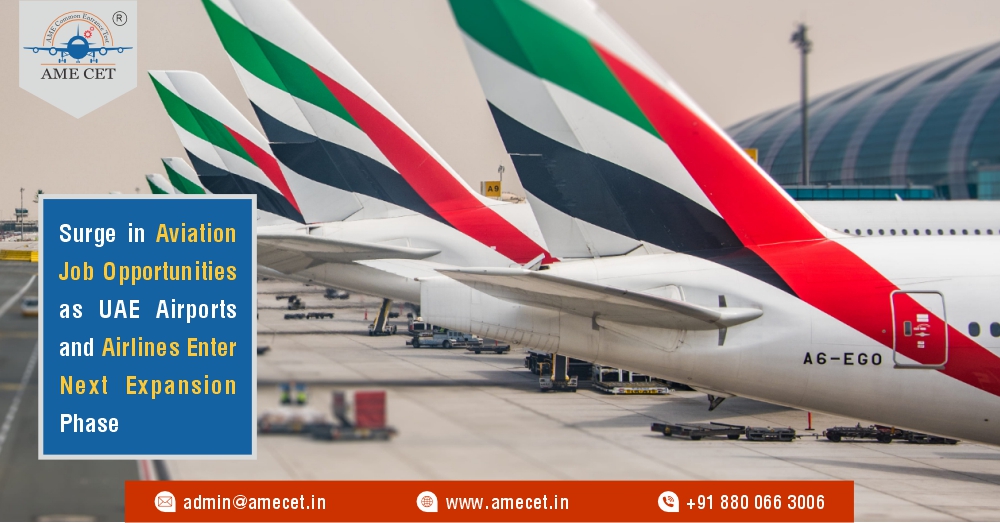
Dubai, UAE – August 10, 2024
The UAE’s aviation industry is about to enter a major growth phase, leading to a big increase in job opportunities. With new plans underway at major airports and airlines, thousands of new jobs are expected to open up, making this a key moment for the UAE's economy and job market.
Aviation Industry Bouncing Back
After the disruptions caused by the COVID-19 pandemic, the UAE’s aviation sector is recovering strongly. Emirates and Etihad Airways, the two leading airlines in the country, are expanding their services to meet the rising demand for travel. This recovery is supported by major upgrades at airports like Dubai International Airport (DXB) and Abu Dhabi International Airport (AUH), which are being improved to handle more passengers and provide better services.
The International Air Transport Association (IATA) forecasts that global passenger traffic will return to pre-pandemic levels by 2025, with the Middle East leading this rebound. The UAE, as a central aviation hub in the region, is seeing growth in its fleet, routes, and airport facilities.
Job Market Booming
The growth in the aviation sector is translating into a surge in job opportunities. The UAE’s Ministry of Human Resources and Emiratisation reports that over 20,000 new jobs will be created in the next two years. These jobs cover a wide range of roles, including technical and engineering positions, customer service, and management.
Emirates Airlines is hiring to support its expanding fleet and network. The airline plans to add 30 new aircraft by 2025, which means it needs more pilots, cabin crew, ground staff, and maintenance engineers. Etihad Airways is also increasing its recruitment to support new routes and service improvements.
Dubai Airports, which runs both DXB and Al Maktoum International Airport (DWC), is investing heavily in new infrastructure. Major projects include new terminals, improved baggage systems, and better security measures. These upgrades are expected to create many new jobs in construction, engineering, operations, and customer service.
Training and Development
To meet the growing demand for skilled workers, airlines and airports are investing in training programs. The Emirates Group is working with educational institutions to offer specialized training tailored to aviation needs. These programs aim to provide the latest skills and knowledge required for modern aviation jobs.
Additionally, the UAE government is supporting local talent through initiatives like internships and scholarships. The National Aviation Services (NAS) is introducing programs to attract young Emiratis to the aviation industry, helping to boost national employment and reduce reliance on foreign workers.
Economic and Social Impact
The expansion of the aviation sector benefits not just job seekers but also the UAE’s economy and society. The aviation industry is a major contributor to the country’s GDP and supports related sectors like tourism, hospitality, and retail. The growth of aviation thus has a positive effect on the overall economy.
Creating thousands of new jobs will boost local spending power and improve quality of life. The influx of new talent will also bring fresh ideas and perspectives, strengthening the UAE’s position as a global aviation leader.
Looking Forward
As the UAE’s aviation sector moves forward, it will focus on maintaining growth while ensuring top standards of safety, efficiency, and customer satisfaction. New technologies, such as artificial intelligence and sustainable aviation practices, will play a key role in shaping the future of the industry.
For job seekers and industry professionals, the coming years offer exciting and rewarding opportunities. With the aviation sector at the heart of the UAE’s economic plans, there are many prospects ahead, highlighting the sector’s crucial role in the nation’s progress.
In summary, the UAE’s aviation industry is entering a new growth phase, marked by significant investments, a surge in job creation, and a focus on innovation and sustainability. As the sector continues to expand, it will play a vital role in shaping the future of the UAE and the global aviation industry.
Category
-
Aircraft Maintenance Engineering (DGCA) (62)
-
(268)
-
Cabin Crew (1)
-
Aerospace Engineering (3)
-
Aeronautical Engineering (2)
-
Airport Management (5)
-
Aircraft Maintenance Engineering (EASA) (6)
-
Airport Ground Staff (1)
-
Commercial Pilot License(CPL) (51)
-
Aircraft Maintenance Engineering (BTech/BE) (1)
-
B.Sc. in Aviation (1)
-
AME CET (5)
